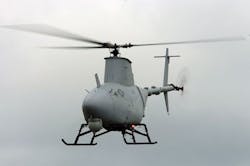SAN DIEGO, Calif., 10 May 2012. The U.S. Navy has placed an order for three additional Northrop Grumman MQ-8B Fire Scout unmanned aerial vehicles (UAV) and one ground control station. The order is valued at $25.7 million.
MQ-8B Fire Scout is an unmanned autonomous helicopter designed for U.S. Navy situational awareness and precision targeting. The unmanned aircraft is based on the Schweizer Model 333 two-seat manned helicopter from Schweizer Aircraft Corp. in Horseheads, N.Y. It can autonomously take off and land on any aviation-capable warship and at unprepared landing zones.
The MQ-8B Fire Scout vertical takeoff and landing tactical unmanned aerial vehicle (VTUAV) has a modular mission payload of electro-optical and infrared sensors, as well as a laser pointer and laser rangefinder, which enable the aircraft to find, track, and designate targets and perform battle damage assessment. The MQ-8 also can act as a communications node for network-centric warfare.
The unmanned helicopter uses the Tactical Control Segment (TCS) software from the Raytheon Co. Intelligence and Information Systems business, the FLIR Systems BRITE Star II electro-optical and infrared (EO/IR) payload, and the Northrop Grumman COBRA multi-spectral mine detection payload. The aircraft also carries the Tactical Common Data Link (TCDL) from Cubic Corp. to relay real-time wide-band imagery and other information.
Northrop Grumman is currently working on a contract to outfit the MQ-8B with a weapons system, the Advanced Precision Kill Weapon System laser-guided 70 mm rocket, under a $17 million contract awarded to the company in 2011 by Naval Air Systems Command. The weapons system is supposed to be operational on the Fire Scout in 2013.
Work for this order will be completed before 2014 and will take place at Northrop Grumman facilities in Moss Point, Miss., and San Diego, Calif.

